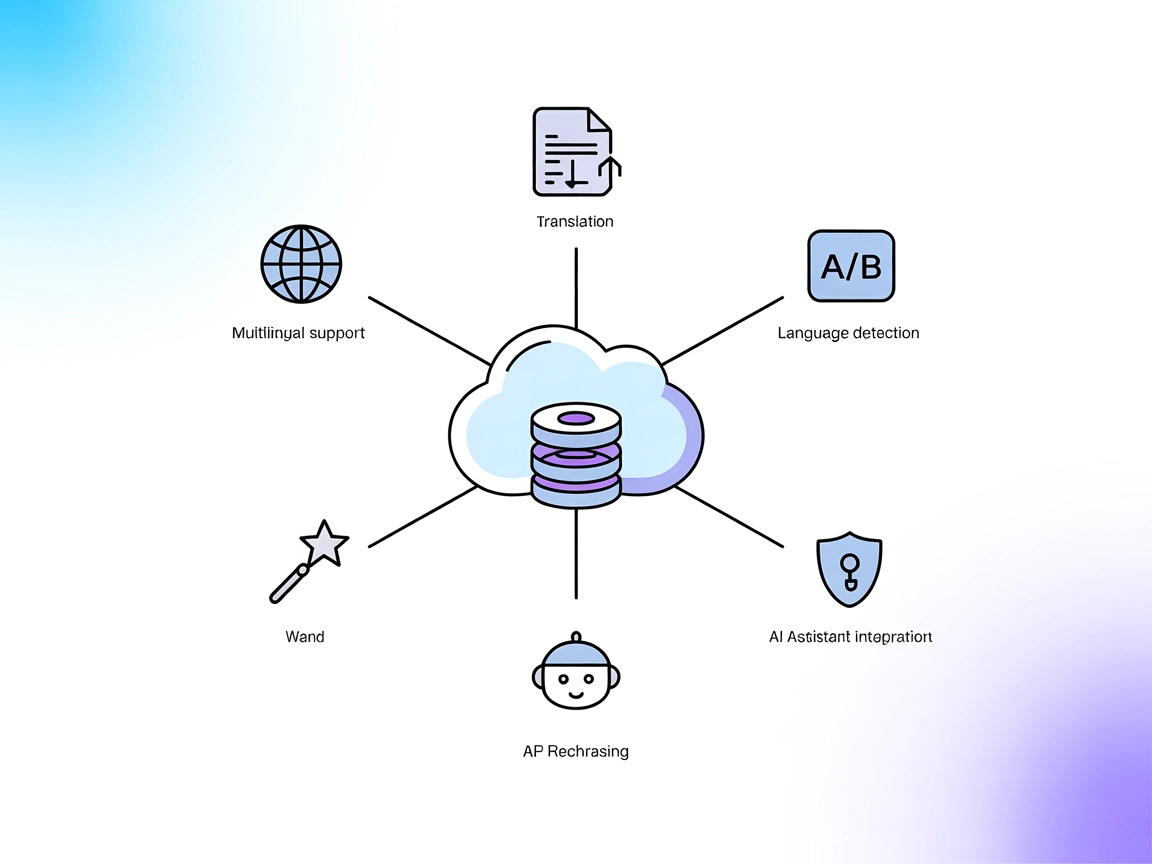
ModelContextProtocol (MCP) Server Integration
The ModelContextProtocol (MCP) Server acts as a bridge between AI agents and external data sources, APIs, and services, enabling FlowHunt users to build context...

Enable your AI assistants to translate, rephrase, and detect languages in real-time using DeepL’s API, all through a simple MCP server integration.
FlowHunt provides an additional security layer between your internal systems and AI tools, giving you granular control over which tools are accessible from your MCP servers. MCP servers hosted in our infrastructure can be seamlessly integrated with FlowHunt's chatbot as well as popular AI platforms like ChatGPT, Claude, and various AI editors.
The DeepL MCP Server is a Model Context Protocol (MCP) server that provides AI assistants with advanced translation capabilities by integrating the DeepL API. It serves as a middleware tool, allowing AI clients to perform real-time text translation, rephrasing, and language detection through standardized MCP interfaces. This server supports development workflows that require multilingual support, automatic language identification, and formal/informal tone adjustments. By connecting AI assistants to the DeepL API, the DeepL MCP Server enables tasks such as translating and rephrasing content, detecting language in user input, and supporting a wide range of languages—enhancing the flexibility and intelligence of AI-powered applications.
No prompt templates are explicitly listed in the repository or documentation.
No explicit MCP resources are detailed in the repository or documentation.
No setup instructions for Windsurf are present in the repository.
~/Library/Application Support/Claude/claude_desktop_config.json%AppData%\Claude\claude_desktop_config.json~/.config/Claude/claude_desktop_config.json{
"mcpServers": {
"deepl": {
"command": "npx",
"args": ["-y", "/path/to/deepl-mcp-server"],
"env": {
"DEEPL_API_KEY": "your-api-key-here"
}
}
}
}
/path/to/deepl-mcp-server with the absolute path to your local repository.your-api-key-here with your actual DeepL API key.Securing API Keys:
Use the env field to store API keys securely. Example is shown above in the JSON snippet.
No setup instructions for Cursor are present in the repository.
No setup instructions for Cline are present in the repository.
Using MCP in FlowHunt
To integrate MCP servers into your FlowHunt workflow, start by adding the MCP component to your flow and connecting it to your AI agent:

Click on the MCP component to open the configuration panel. In the system MCP configuration section, insert your MCP server details using this JSON format:
{
"deepl": {
"transport": "streamable_http",
"url": "https://yourmcpserver.example/pathtothemcp/url"
}
}
Once configured, the AI agent is now able to use this MCP as a tool with access to all its functions and capabilities. Remember to change “deepl” to whatever the actual name of your MCP server is and replace the URL with your own MCP server URL.
| Section | Availability | Details/Notes |
|---|---|---|
| Overview | ✅ | |
| List of Prompts | ⛔ | |
| List of Resources | ⛔ | |
| List of Tools | ✅ | |
| Securing API Keys | ✅ | Use "env" |
| Sampling Support (less important in evaluation) | ⛔ |
Based on the above, the DeepL MCP Server is focused and production-ready for translation tasks, but lacks documented prompt templates and resources, and has limited out-of-the-box configuration guides for platforms other than Claude. It covers essential security with API key management and offers a robust set of translation tools.
This MCP server scores moderately high for utility and real-world applicability due to its robust translation tools and straightforward Claude integration, but loses points for lack of resource and prompt documentation and limited cross-platform setup guidance.
| Has a LICENSE | ✅ (MIT) |
|---|---|
| Has at least one tool | ✅ |
| Number of Forks | 5 |
| Number of Stars | 19 |
The DeepL MCP Server is a middleware that brings DeepL’s advanced translation, rephrasing, and language detection to AI assistants. It acts as a bridge between your AI workflows and DeepL’s API, supporting real-time multilingual communication and tone adjustments.
It offers tools for retrieving available source and target languages, translating text, and rephrasing content—enabling AI agents to handle a wide range of language tasks programmatically.
Use the `env` field in your MCP server configuration to store your API key. This keeps sensitive data out of your codebase and ensures secure access management.
Yes! Add the MCP component to your FlowHunt flow, input your DeepL MCP server configuration, and your AI agent will instantly gain access to translation, rephrasing, and language detection features.
Yes, DeepL’s API and the MCP server support formality adjustments, letting you tailor translations for professional or casual use cases.
Detailed setup instructions are provided for Claude Desktop. Other platforms like Cursor and Cline are not explicitly documented, but the MCP server is compatible if correctly configured.
Boost your chatbot or AI workflow with DeepL MCP Server for seamless, real-time translation, rephrasing, and language detection—no manual coding required.

The ModelContextProtocol (MCP) Server acts as a bridge between AI agents and external data sources, APIs, and services, enabling FlowHunt users to build context...

The DeepSeek MCP Server acts as a secure proxy, connecting DeepSeek’s advanced language models to MCP-compatible applications like Claude Desktop or FlowHunt, e...

The Model Context Protocol (MCP) Server bridges AI assistants with external data sources, APIs, and services, enabling streamlined integration of complex workfl...
Cookie Consent
We use cookies to enhance your browsing experience and analyze our traffic. See our privacy policy.